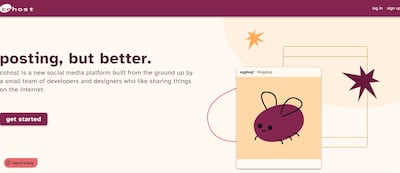With all the noise currently surrounding Twitter, it would be easy to believe that Elon Musk's social media site is the biggest and most influential platform in the world.
This isn’t true.
According to Statista’s report in January that ranked social networks, Twitter’s 436 million monthly active users are dwarfed by many other platforms. It sits in 15th place, behind the likes of Facebook’s 2.9 billion, TikTok’s one billion and Snapchat’s 557 million.
As Musk’s vision for Twitter raises eyebrows, celebrities are leading the way in announcing they're quitting, while the platform's co-founder Jack Dorsey is also looking to launch his newest social media site BlueSky early next year.
So, whether you’re bidding goodbye to the bird or simply looking to discuss why Henry Cavill quit The Witcher elsewhere, here are five alternative places to chat.
1. Mastodon
The platform, which launched in 2016, has become the first port of call for those leaving Twitter, with Gizmodo reporting that it has around 5.8 million users as of the beginning of this month.
A non-profit organisation developed by German software developer Eugen Rochko, users can post 500-character messages featuring pictures, videos, polls and emojis.
The platform is free of advertisements and posts are received in chronological order as opposed to pre-selected by an algorithm.
It is different to Twitter in that there is no central website to log in to. Instead, users access Mastodon through their web browser or third-party apps. It is also part of a growing “Fediverse” — a federated universe of platforms.
“It has no ads, respects your privacy, and allows people/communities to self-govern,” says Rochko. “We present a vision of social media that cannot be bought and owned by any billionaire, and strive to create a more resilient global platform without profit incentives. We believe that your ability to communicate online should not be at the whims of a single commercial company.”
2. uSync

New to the market, uSync was beta launched last month, and costs $3.99 per month.
Users can choose between posting longer blog-style content to be shared along with images and videos in the “story” area or quick-fire 275-character thoughts in the “scribbles” section.
The site also gives users the chance to choose the kind of content they see by seeking specific communities.
Chief executive Darrell Lynn, a former director at Apple, previously told USA Today: “Our intent is not to make any kind of political or cultural decisions for the human race. What we’re trying to do is make sure we’ve got an honest and authentic conversation among people that isn’t as toxic as what currently exists.”
3. Counter Social

The homepage for Counter Social promises: “No Trolls. No Abuse. No Ads. No Fake News. No Foreign Influence Ops.”
Created by Jay Bauer, a developer at Ambit software, the platform declares itself to “take a zero-tolerance stance to hostile nations, bot accounts, trolls and disinformation networks".
The layout consists of seven columns with the first being the user's posting column where posts (“toots”) of up to 500-characters long can be created.
The other columns include the main community feed (the “firehose”) shown in chronological order, which can be curated; a feed featuring friends’ posts; notifications and hashtag feed columns; personal profile and a news feed option which can be paused.
Toots do not immediately show the number of likes they have received, so users are influenced by the quality of the content rather than the popularity.
4. Tribel Social

As with Counter Social, Tribel Social is leaning heavily into the “no abuse” rules, dubbing itself as the “kinder, smarter social network” as a selling point to lure users tired of being attacked on Twitter.
“Unlike Musk’s Twitter, we don’t put ad revenue over decency & truth,” a representative of the site declared this week. “Purveyors of racism and pro-Putin propaganda are not welcome on Tribel, our pro-democracy Twitter alternative.”
The layout of the site is simple. Users can target specific audiences with posts to maximise their engagement and customise their feed by inclusion (“my favourites”) or exclusion (“everything except”).
For those who seek status on platforms, there’s the opportunity to become a “star contributor”.
5. Cohost

Currently only available on desktop as they work on the app version, Cohost, which is still in its infancy having launched in February promises no advertisements tracking or algorithms.
It also isn’t free, with the company declaring: “For now, you can give us a few bucks a month to help us keep the lights on.”
“Modern social media is designed around a vicious feedback loop that keeps users engaged at the expense of their mental health, all in order to make their executives more money,” says the website.
Posts (dubbed “coposts” or “Chosts”) appear chronologically with no character limit, and users can create their own pages a la Tumblr or collaborate on pages with others, giving it more of a blog site feel than Twitter.
Celebrities who've quit Twitter following Elon Musk takeover - in pictures









